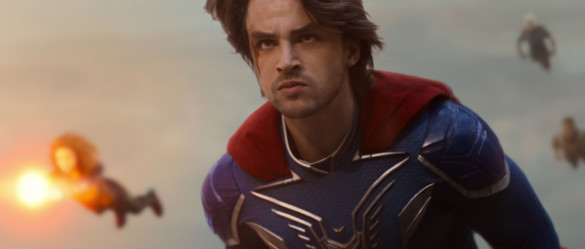By Greta Chiocchetti
Mark Millar was struck with the concept for his superhero drama comic “Jupiter’s Legacy” when he read about a particularly iconic hero’s painfully human experience in the limelight.
“The idea came to me when I read Carrie Fisher’s memoirs,” Millar told SFX Magazine. “She was talking about how even though she was Princess Leia, and everyone loves Carrie Fisher, she never thought that she really was special because her mum and dad (actor Debbie Reynolds and singer Eddie Fisher) were two of the most famous people on the planet. That really stayed with me. I thought, ‘Even Princess Leia feels the sense of not living up to her parents.’ So I just incorporated that.”
When Millar’s comic, “Jupiter’s Legacy,” was published in 2013, it struck a chord with fans of the superhero genre who could relate to its flawed characters. Coming to Netflix on Friday, May 7, this new live-action series follows an elder league of superheroes—the Union—through decades of American history. “Jupiter’s Legacy” examines socio-political and economic events and a new generation of superheroes desperately trying to measure up to their parents. The son of the Union’s leader Sheldon aka the Utopian (Josh Duhamel, “Transformers”), Brandon Sampson, aka the Paragon (Andrew Horton, “It Came from the Desert”), struggles to live up to his father’s expectations of the American ideal. At the same time, his sister Chloe (Elena Kampouris, “Sacred Lies”) doesn’t even try. Sheldon, who leads through a strict moral code, grapples with the power dynamic with those close to him, including his estranged best friend George (Matt Lanter, “Star Wars: The Clone Wars”) and his rebellious son Hutch (Ian Quinlan, “Gotham”).
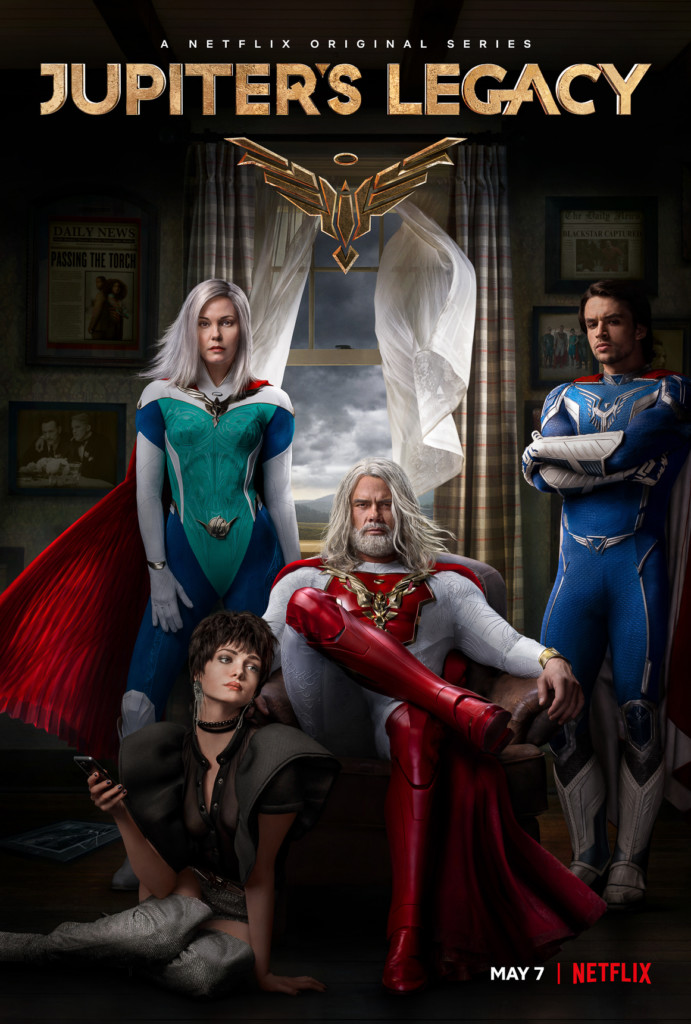
Ahead of “Jupiter’s Legacy” release, Art U News spoke with Kampouris, Quinlan, Horton, and Lanter during a roundtable interview about its themes of justice and equality, the cast’s natural chemistry, and the show’s examination of good versus evil.
Elena Kampouris, Ian Quinlan, and Andrew Horton
One of the most interesting things to me about this series is the way it uses superheroes to examine social, political, and economic issues through the United States’ history—given that we’ve been living through so many movements and historical events over the past year or so, did that affect the way you related to the storyline at all?
Ian Quinlan: When I first read this series, the biggest thing for me was the fact that the show kicks off with a person of authority executing somebody without due process. So, that’s a pretty big deal. And that struck me pretty hard.
The Utopian says bad guys are people too. We’re actually kind of seeing what these people are like, and seeing their general humanity. And it’s, in a way, starting the conversation of like, “Where are we going? And who do we want to be? And how do we want to live amongst each other?” And so that, to me, was a really epic story to tell. I was really excited to be a part of that, especially as my role, Hutch, who is sort of this counterculture revolutionary who’s trying to offer the counter-narrative to this family’s so-called legacy.
Elena Kampouris: It’s a big part of what [Mark] Millar has packed into this juicy, juicy comic. What I love about it is this isn’t just a superhero, cookie-cutter spectacle—like explosions—thing. It’s got so much more to it. There are so many layers of so many conversations that hopefully can be sparked from this discussion. And, to me, whenever I look at material stories, in general, to me, the most compelling things, much like Shakespeare, have themes that you can parallel to today … something that could still be seen as relevant to issues that we are going through. If it’s universal, that’s the mark of strong storytelling. And that excites me; I think that resonates. And that kind of show stands the test of time.
Andrew Horton: In terms of it being a human story, I think that’s what makes it individual [compared] to a lot of superhero stuff that is already out there. We really focus on these intermediate relationships within the show. And it’s almost more of a drama than it is a superhero action-packed show. It treads the line and balances these huge, massive action sequences with incredible CGI, and explosions and all that wonderful stuff—which the superhero fandom loves—and then you can bring it back down to an incredibly poignant scene between a father and a son, a mother and a daughter, a brother, and a sister, all of these kinds of things. Incredibly relatable to pretty much anyone who is watching it, and the fact that we touch upon socio-economic, political, religious factors within the show is why I think it just gives it that extra dimension that potentially other shows don’t have as much of. It’s really exciting for us to be a part of that and to be unleashing here in the world in just over a week.
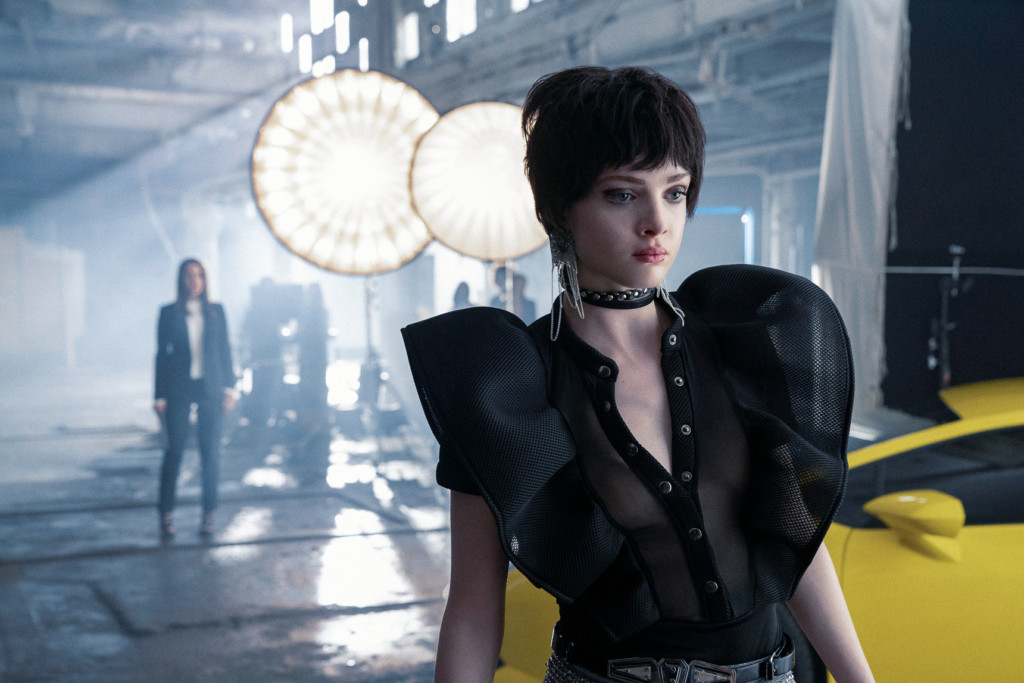
IQ: One more thing I’ll say about that, too, is that the show heavily explores power and privilege. We see what has been an institution that is over 100 years old that has been operating under a code of conduct that has gone unquestioned for quite some time. And now we’re at a pivotal point in this country where the country is asking, “Do we need to change and do we need to evolve?” I think some of these people are saying like, “Hey, these guys have been flying up in the sky for so long that I think they forgot about the people on the ground. And what are they really doing? Who are they really serving?”
How do you think your characters differ from other superheroes represented in the media?
EK: These characters are so multi-layered. Within the sense of Chloe, as I play her—I’ll take that route—you know, here’s someone who has major trust issues, major issues with her father: her father who is kind of that trope, that cliche—you could say—the “perfect” superhero. And then you’ve got Chloe, who has superhuman abilities, but she doesn’t want anything to do with that—she wants to forge her own path, she doesn’t feel embraced by her family unit, she doesn’t feel like the code is actually serving her or serving anybody. She feels like it’s more of a box that her father, who invented the whole thing, is trying to put her in.
So, you’ve got these superheroes, I think, this is where we kind of distinguish ourselves in this whole space is that you have these superhuman, seemingly perfect people with super abilities, but they have human issues: Chloe is dealing with drug addiction, which I’m so glad that our writers didn’t choose to shy away from that topic. We’re showing that just because you have super strength, you’re not immune to human issues. We’ve got the Sampson family, that’s pretty much, as we were saying, like the equivalent to the royal family of supers. But they have major dysfunction; they’ve got major baggage—no one’s immune to it. This show doesn’t stay on the periphery, we go deep, and we got really intimate. It gets pretty gritty, but I think that’s the best way. Because when you have sci-fi, and you have spectacle, and you even got period thrown in there, because we go back in time, I think by virtue of that, with that lens, it kind of makes a nice icebreaker to talk about these kinds of issues … delve into real things like addiction, and so on and so forth. So, I think it’s a great vehicle for that. And I think it’s unique in the way we do it.
AH: It covers a multitude of things—it is much, much more than just what’s on the surface. And I think the really striking thing about the show is that everyone in the show is flawed. There’s no one perfect person; despite the fact that the Utopian’s supposed to be like this standard of perfection and excellence, he still isn’t perfect. And I think that’s what Brandon struggles so much with, is the fact that that’s all he’s ever wanted to be, and then he still sees the Utopian as a contradiction.
Within Mark’s writing, as Elena was saying, he doesn’t shy away from the darker things. And I think that’s what distinguishes us from more sort of family-orientated superheroes. It’s not saying that this isn’t family-oriented, but it’s on the other end of the scale; this is not directed for youngsters necessarily, and the people who won’t be able to watch gore and drug use and sex and things like that. It’s more of an adult superhero genre. And I think that’s what’s really enjoyable about it, is that you get to have these moments of darkness. And you get to have these more real characters because they aren’t perfect.
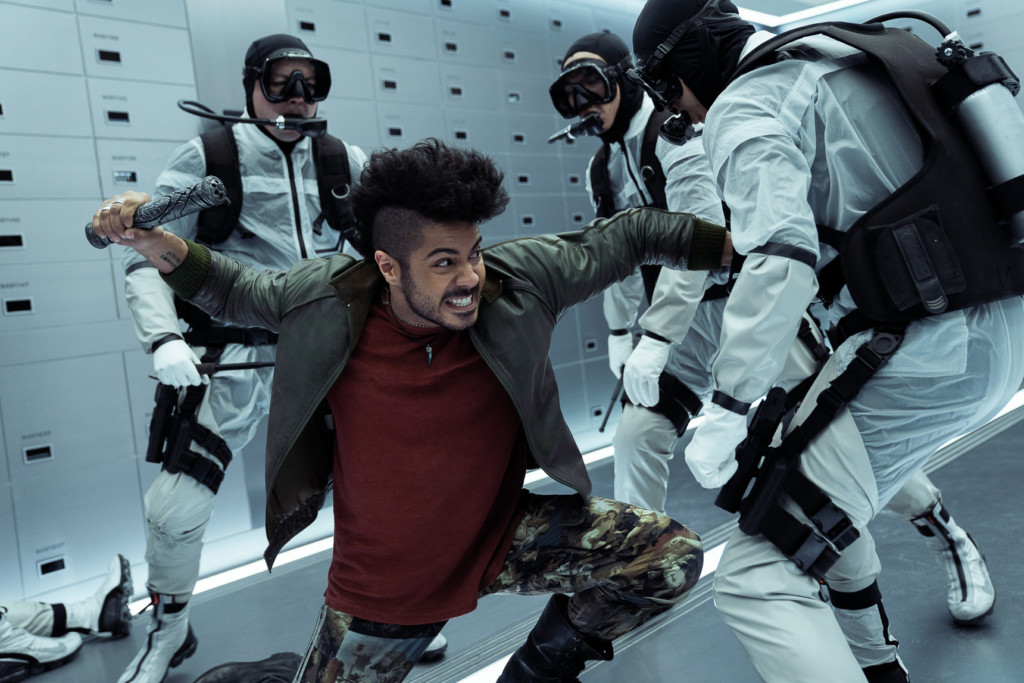
IQ: I would say that Hutch might be unique in his strategy of heroism, or antihero-ism if you will. But I think we’ve seen this before. In our reality and other comics, we see a guy who is rejecting the status quo, who decides to live outside of this way of being, to forge his own path, and actually, to try to expose the flaws in this paradigm that has been set by these authority figures.
[Hutch is] this guy who’s questioning, “Are we living up to the values of the symbols that are on the chests of these heroes?” [It] is a question I’ve seen happen in our lives. Colin Kaepernick taking a knee, saying, “Are we living up to the values of the flag?” I see it in the 1968 Olympics. I see it in Muhammad Ali rejecting going to Vietnam. We have seen heroes like this throughout the decades, just as we’re going to see “Jupiter’s Legacy’s” Union throughout the decades and how they responded to these incidents. I think this guy is here to really challenge the world in a way that people aren’t really ready for.
So much of the show is about family and chosen family. How did you develop relationships off-screen, and how did that play into your on-screen performances?
EK: I have to say I’m very grateful because they truly feel like family to me. Also, a little side note, but do I not have a really handsome boyfriend and brother? At casting, they just knew what they were doing!
But I think a big part of the bonding was that we were training together a month before we started up. Also, talking about the scenes in general and unpacking the material, I felt such a great chemistry with Ian when we were delving into Clutch, this really fiery relationship. And then with Andrew, playing this brother-sister dynamic, the chemistry, I really felt that there and I hope it will show on both ends on the screen. But it was fun to see what these two are bringing to each encounter, the way they would play. It’s exciting as an actor when people will surprise you with things, and it lifts your game up when someone is bringing ideas and doing things you don’t expect.
IQ: Andrew and I don’t have any scenes together, but we all have to work out together to get in shape for this show. So, Andrew and I work out as a pair sometimes. And we would get to talking about the storylines, about how our characters are kind of foils of each other: two men, with their respective daddy issues, and how they’re respectively handling it. It would help us understand how our characters are foils of each other, but also what our own family lives were like growing up and what our own relationships with our dads were like, and that was really interesting to kind of [get to] know him and get an understanding of what he’s doing even though I don’t see him to kind of give that alternative perspective when I’m on set.
With Elena—
EK: Tell the story!
IQ: So, we’re doing a chemistry read. I’m meeting Elena for the first time and … it’s a very hot and heavy scene. [I]t was the scene where I tell her that her dad came to see me. And we’re doing this hot and heavy scene. And the casting director’s like, “If you want to kiss her, just ask her beforehand.” And then we started. We didn’t have any time because there was a whole kerfuffle. We just went right into reading it. And then the scene ends with us pretty much making out. And then we both broke. And I was like, “Oh, I’m so sorry. I was supposed to ask your permission.” And she’s like, “No, no, it’s fine. It’s fine.” And then, the casting director’s just looking at us, like, “Are we interrupting?”
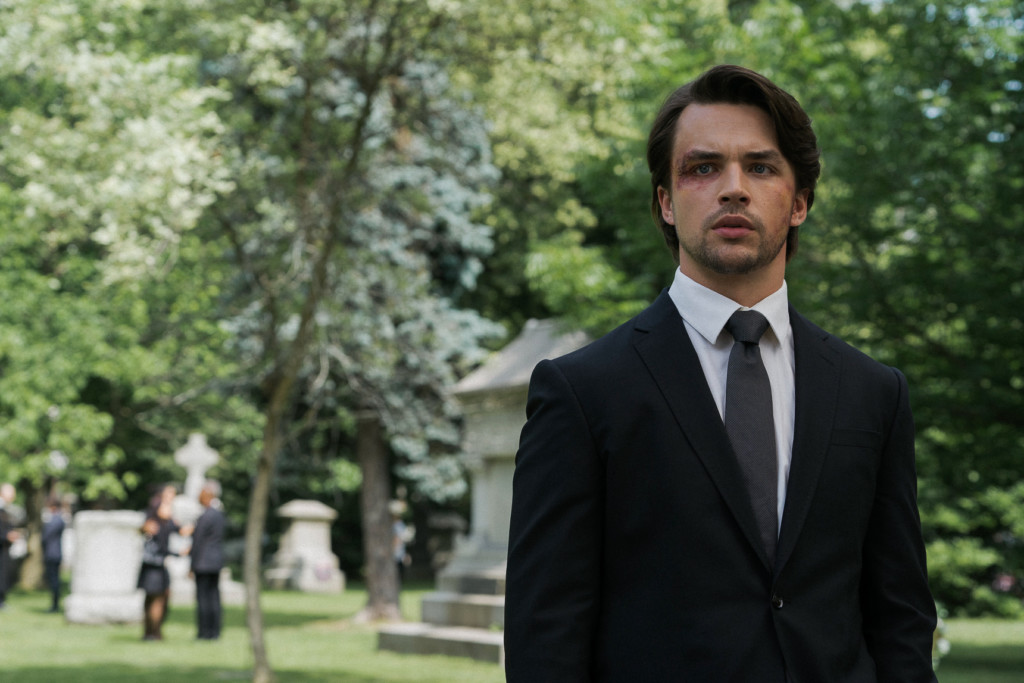
EK: It was electric; it was straight fire! And afterward, he was apologizing. I was like, “You don’t need to apologize! This is fun.” [Laughs]
AH: It was super, super fun getting to work together. [Ian] and I didn’t have any scenes together, but our characters, despite sort of being such opposite ends of the spectrum on the show, are actually remarkably similar in a lot of ways. And it was just so lovely to get to know him and on a personal level and to train together, to go out for drinks and eat together and talk about the show.
We also had the absolute privilege of working with some incredible directors. One particular director for a scene that Elena and I are in together was Mark Jobs, who is another Brit. So, there weren’t a lot of Brits on the show, and that made me feel a little bit more comfortable because it was a big scene for Elena and [me], and Mark approaches work in a way that is almost akin to theatre. So, it was really, really asking about the intentions of the characters and what is driving them in this scene. And I feel that he would have pulled exactly the same out of Ian though I can’t speak for him. But that’s the kind of dynamic we had, not only with each other but also with the directors.
The show focuses on power dynamics—how did power play into how you played your respective roles?
IQ: I think power gives a person an insatiable hunger for more power. We’re seeing that the characters think they’re doing the right thing. I see Brandon crippled by the fact that he doesn’t have more power because he’s trying to fill his father’s shoes. I see Brainwave wanting to do more, politically, with the power that he has—he’s still not satisfied in the position that he possesses. I see Sheldon—who’s a great human being—as a good man trying to do the right thing, [who,] for some reason, can’t remember the names of the people in his own teams outside of their power names. Like he doesn’t really know who they are, he only knows them as how they serve the Union and with their power. And so, I just feel like we’re learning about the nature of power and how it can eventually blind you or keep you from seeing the humanity of others or seeing an alternative perspective. And I think “Jupiter’s Legacy” is really gonna open that door to have that conversation, which I’m really excited about.
